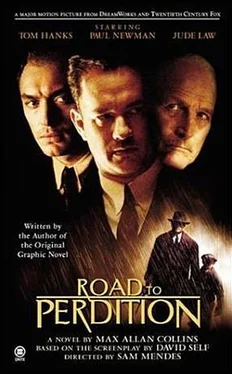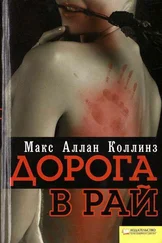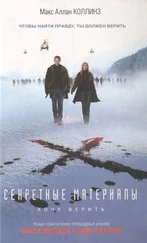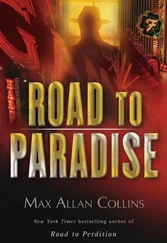When O’Sullivan returned to the room, Michael was under the covers, shivering. It was cold in there, and the blankets were skimpy and threadbare, and the kerosene floor heater blew less hot hair than Uncle Bob.
“Didn’t you pack a sweater?” he asked the boy.
“No. I forgot.”
O’Sullivan almost reminded Michael that he certainly hadn’t “forgotten” to pack those comic-strip books and toys; but instead the man went to his own suitcase, found a sweater, and started putting it on over the boy’s head.
Michael pulled it out of his father’s hands, putting it on himself, in a small show of defiance.
His son was obviously upset about his father leaving him at the uncle and aunt’s. But O’Sullivan had said all he intended to on the subject, and went to the sink to wash up for bed.
From behind him, his son — his voice sounding very small — said, “I miss Mama and Peter.”
“I know,” O’Sullivan said, wishing he knew something about comforting a child. “I miss them, too.”
That same evening, Maguire was in his studio in his Chicago apartment, in the red glow of the darkroom, surrounded by shelves of his beloved cameras, developing his photos. With tweezers, he fished a photo of the dead oaf out of the tray of fixing solution, then hung it up to dry. He was on photo number six, the last of the usable shots, when the phone rang.
With no sense of urgency, he wandered out into the living room of the small but nicely furnished flat, adorned with the artist’s own work: framed photos of dead bodies, here a corpse in a pool hall, there a shot-up gangster in a corridor, here a bloody naked suicide in a bathtub. It was home to him — he just didn’t bring his dates here.
Flopping on the sofa next to the phone on an end table, he answered with his usual, “Harlen Maguire.”
“Frank Nitti,” the assured voice said on the other end of the line.
Maguire scribbled on a pad as Nitti spoke, making notes, doodling, as the ganglord filled him in on the assignment, saying, “This may take some time — some real tracking, some real research. I can offer you sixteen hundred.”
“Good... because that’s my usual rate, Mr. Nitti. As you know... And anything I make on the photographs is mine.”
“I’m not interested in photography, Mr. Maguire. But I do think creating evidence at the scene of your own crimes is reckless.”
“I’m still around. You’re still calling.”
“I need you to drop everything. You need to go right away.”
“That’s no problem.”
“The funeral’s tomorrow afternoon — it’s a three-, maybe four-hour drive to the Tri-Cities.”
“I travel light.”
Nitti paused. “You do know who Michael O’Sullivan is.”
“Sure. Never met him. But I know his work... Angel of Death, pretty fancy moniker.”
“Well deserved.”
“You don’t have to tell me. I’m a fan of his. So... he isn’t traveling alone — there’s a kid?”
“His son — Michael O’Sullivan, Jr. Eleven. Looks younger.”
Maguire wrote the boy’s name and age down and then turned the “11” into a square and made it into a face, drawing hair, ears, and two dots for eyes.
“So,” Maguire said, “what do I do with junior?”
“What do you usually do with witnesses?”
“Okay.” He drew a downturned mouth on the doodled face. “Will do.”
And they said their good-byes, and he hung up, knowing he should have asked for more, for clipping the kid; but not wanting to cross Nitti. It wasn’t a matter of being afraid of the gangster, though Nitti was not to be underestimated, former torpedo that he was. It wasn’t that, at all...
Maguire got up to straighten one of the framed photos — he’d noticed it hanging crooked, as he spoke to Nitti. This shot was of a murder, or rather murders, he hadn’t done; but one of his nicest compositions nonetheless: six corpses on the floor of S-M-C Cartage, brains spilling out of their shattered skulls — the seventh corpse had crawled out of frame, toward the door, compromising but not really spoiling this record of the St. Valentine’s Day massacre.
No, Maguire didn’t want to risk losing the assignment.
He’d always wanted to meet the Angel of Death. And adding Michael O’Sullivan’s portrait would be a crowning touch to his photo gallery.
The next day, when Michael awoke, the sun was filtering in brightly through the drawn curtains. An oily, metallic smell was in the air — like a machine shop. He looked over toward his father’s bed and saw his father sitting there like an Indian, with newspapers spread out before him on top of the covers and the parts of the tommy gun arrayed like dishes of food on a picnic.
Papa had rags and various pipe-cleaner-like tools and little bottles of stuff. He was methodically cleaning the pieces of the weapon. The pistol lay to one side — either waiting its turn, or already finished with.
The boy rubbed his eyes. “What... what time is it?”
“After two.”
The boy tried to make that work. He sat up. “In the afternoon?”
His father nodded. “You were tired. I slept a long time, too... We needed it. Wash up and get dressed.”
“Are we going?”
“We’ll eat. There’s something we need to do... We’re staying here tonight.”
“Again? Why?”
“Resting up. Getting ready. Go — wash up.”
They walked to the town square — it was only a few blocks — and ate at a little café. Michael asked if he could have breakfast instead of lunch, and they were nice and fixed him eggs and bacon and pancakes. Papa ordered the blue plate special, which was meat loaf and mashed potatoes, but he didn’t eat much of it.
Afterward, Papa said, “Let’s take a walk,” and the day seemed cold and dreary for that, but Michael was in no position to argue. They crossed a little park and, a block off the business district, came to a small country church — a Catholic church. Michael quickly realized this was his father’s destination — Papa must have spotted the church when they came into town.
In the gravel parking lot, Michael tugged his father’s sleeve and the man stopped and looked down at his son.
“Why are we going here?”
“There’s a funeral today.”
“At this church?”
“Back home.”
“For Mama? And Peter?”
“Yes. And we’re not there. But we should go in, and light a candle for them. And pray for them.”
This seemed reasonable to Michael, but something else didn’t. Confused, he asked, “Are you sure we can go in there?”
“Of course we can.”
“But, Papa... it’s a Catholic church.”
His father’s smile was so faint, it could barely be made out. “The reach of our enemies doesn’t extend here. We’ll be fine.”
Michael sat in a pew in the back of the church while his father knelt at the altar, praying before Christ on his cross. For a small church, they had a really big Christ — he looked real, and even from where Michael sat, the Lord’s suffering was obvious. He watched as Papa lighted two candles — one for Mama, one for Peter. Then Papa lighted one more candle, which puzzled the boy.
After a while, the black-robed priest — white haired, well fed, with an expression that was both friendly and serious — stepped from the sacristy, and stopped to study the stranger, still kneeling, praying.
The priest introduced himself as Father O’Hara and then spoke with Papa — Michael couldn’t hear the rest of it, they were almost whispering — and then the priest went back to the sacristy and soon returned, in his vestments. Then Papa stepped into the confessional.
Michael sat and prayed for his mother and his brother, and finally his father came out, having unburdened his soul. The priest came out, too — Michael knew that God had made Irishmen pale, but not as pale as that priest looked.
Читать дальше












